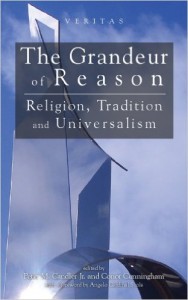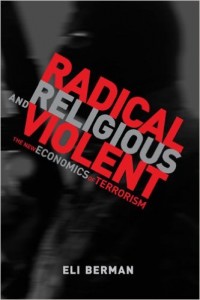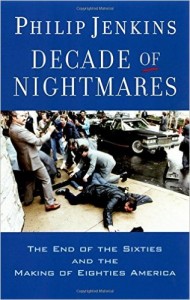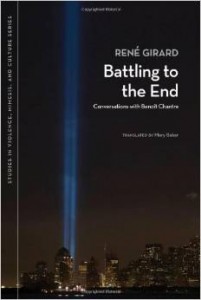
It may be little comfort to have the realization terrorism has its rather quotidian logic. Yet, if you really think about it, it is much less comforting to have the realization that if terrorism is automatically declared out of the bounds of rationality, then responses to it will likely be equally irrational.
I suspect many of us are still reeling from the fallout of the Orlando night club shooting.
Yesterday I reported on the pope’s reaction to it in the piece Pope Francis Unequivocally Condemns Florida Man’s Gay Bar Shooting Rampage. The last lines of his official statement contained a call for rationality in the face of such homicidal hatred.

There’s is no surprise in this since the Catholic Church is one of the few remaining defenders of reason in a postmodern world:
We all hope that ways may be found, as soon as possible, to effectively identify and contrast the causes of such terrible and absurd violence which so deeply upsets the desire for peace of the American people and of the whole of humanity.
I also alluded to Eli Berman’s timely book Radical, Religious, and Violent: The New Economics of Terrorism in yesterday’s post on the gay bar shooting. Berman goes through and takes apart the usual list of illogical reasons the layman usually propose for terrorist motivations. After completing that task he goes on to make his own original, and much more frightening proposal for what motivates terrorists such as the Palestinian suicide bomber:
If not theology, ideology, anger, or psychosis, what is the primary motivation of Palestinian suicide attackers? Merari does not claim to have a single simple answer. The suicide attackers he studied were typically not ignorant or economically deprived (relative to their neighbors), and had generally not suffered the loss of a close friend or family member. Although they defy simple characterization, if we were to look for a single answer, I think it must be that these individuals are altruists—at least with respect to their own communities. Merari’s research suggests that the attackers truly believe that their courageous act will bring great benefit to some cause, and that their neighbors, community, or country will benefit.

Then Berman makes some truly uncomfortable analogies:
An altruistic suicide attacker is an uncomfortable idea, so we should stop and consider his (or sometimes her) psychology for a moment. Altruism seems strange and even insulting to us when combined with a callous lack of empathy for the basic humanity of the victims. Unfortunately, such a lack of empathy is not unusual in an environment of violent conflict and certainly would not qualify as a psychosis in that setting. On the other hand, altruistic acts on behalf of a cause are quite common, especially if the cause is the safety of their family or community, or perhaps the liberation of their country. Firefighters ran up the stairs into the burning towers on September 11. They selflessly and regularly endanger their own lives. Bus drivers in Israel who suspect that a suicide bomber has boarded their bus have clear instructions: physically kick the suspect from the bus, and failing that, throw your body on top of the attacker to absorb the explosion. Soldiers throw their bodies on grenades to protect their comrades. The pilots who won the Battle of Britain faced a shockingly high risk of being shot down in order to defend their country. Perhaps terrorists see themselves as well-balanced altruists, and heroic at that?
 Altruism?! I suspect you weren’t ready for that. I read this book about four years ago and mostly repressed this bit of information. But it’s this altruistic ordinariness that really puts the terror in terrorism:
Altruism?! I suspect you weren’t ready for that. I read this book about four years ago and mostly repressed this bit of information. But it’s this altruistic ordinariness that really puts the terror in terrorism:
A large pool of psychologically healthy, basically altruistic, suicide attackers? That is truly disturbing and frightening idea, which may be why we’ve been more comfortable thinking of them as psychotic or brainwashed, despite decades of evidence to the contrary, dating back to the secular terrorists of the 1970s. Yet understanding the phenomenon requires an unblinking look at Merari’s findings. For one thing, the idea of psychologically healthy suicide attackers is disturbing because we would like to be able to draw an ethical distinction between acts of courage and altruism on our side and acts with the same motivation by our enemies. Firefighters, police officers, and soldiers who stare death in the eye when protecting and defending us are altruists. We think of them as heroes, and justifiably so. Altruism, we would like to believe, should be reserved for the “good guys.” Like it or not, many people in conflict-ridden parts of the world feel the same way about suicide attackers who target civilians in the name of some higher cause. The ethical distinction between targeting civilians and targeting combatants is not compelling to many people, particularly in the Middle East. The key is how they judge terrorist acts, not how we do.
There’s plenty more to explore in Radical, Religious, and Violent, but I think I’ve frightened you enough for today–I’ll do my best to come back to it later.
 Doesn’t this emphasis upon altruism, which blurs the lines between us “normal people” and the “abnormal” terrorists remind at least some of you of watching Battlestar Galactica and slowly realizing how little separates the Cylons and the humans? At the start of the show the difference seemed clear, and then slowly, but surely, it began to erode. This is not a coincidence. I’ve been told numerous times that the show’s writers actively engaged the War on Terror and all the debates surrounding the torture of terrorist suspects.
Doesn’t this emphasis upon altruism, which blurs the lines between us “normal people” and the “abnormal” terrorists remind at least some of you of watching Battlestar Galactica and slowly realizing how little separates the Cylons and the humans? At the start of the show the difference seemed clear, and then slowly, but surely, it began to erode. This is not a coincidence. I’ve been told numerous times that the show’s writers actively engaged the War on Terror and all the debates surrounding the torture of terrorist suspects.
By the way, the passage also reminds us how the most recent wave of terrorism has its roots in Western secular terrorism. Jenkins’ Decade of Nightmares: The End of the Sixties and the Making of Eighties America is one of the best accounts of how the 60’s, 70’s, came to shape the 80’s–and continue to shape our time.
Before I go, should you want to keep going into the logic of terrorism on your own, then I think Max Scheler’s now mostly overlooked Ressentiment and Rene Girard’s Battling to the End are indispensable guides for going futher beyond the headlines.
NOTA BENE. For those who need things spelled out for them (there’s always someone): Saying that terrorism has an altruistic logic is not tantamount to endorsing terrorism.
See also: Will We Once Again Enlist Islam Against Western Extremism? and A French Genocide and Salvation Outside the State.
Girard: Islamic Extremism is Symmetrically Related to Western Wealth is sure to spark some debate as well.
Stay in touch! Like Cosmos the in Lost on Facebook:
Please consider making a donation to keep this blog going in tough financial times through the donation button on the upper right side of its homepage.












